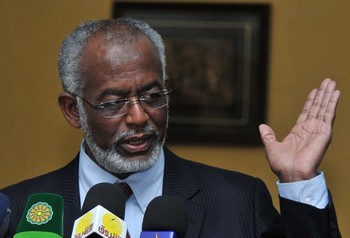Sudan denies providing rockets to Hamas, says Israel looking for scapegoat
July 25, 2014 (KHARTOUM) – The Sudanese government has refuted allegations that missiles used by the Palestinian Islamic Resistance Movement (Hamas) to shell Israel are made in Sudan saying the Hebrew state is looking for a “scapegoat”.

“How can missiles which were claimed to be made in Sudan reach Hamas while there are 12,000 kilometers [distance between Sudan and Israel] controlled by Israeli and international satellites. The Egyptian army is also controlling every inch of the boarders [between Sudan and Egypt], so how could these missiles be entered into Israel?” he wondered.
Israeli press reports quoted Israel’s army as saying that missiles which fell within its territory were made in Sudan vowing harsh response against Khartoum. But the Sudanese army on Monday dismissed these claims as “unfounded”.
Karti said that Hamas obtained and upgraded military equipment which Sudan cannot make; adding that Israel is really concerned about the fact that it couldn’t stop the attacks carried out by the Palestinians and threaten to destroy it.
He underscored that Israel seeks to look up for a “scapegoat”, saying Sudan doesn’t deny its support for the Palestinian cause.
“But no one could claim that Sudan is the source of these developed missiles”, he added.
On Monday, Israeli newspapers echoed rumors saying the Israeli aircraft on Friday 19 July bombed a weapons depot in a military training camp outside the Sudanese capital, Khartoum.
However, the Sudanese army denied the attack, saying the incident was caused by a fire.
It is widely believed that Israel carried out at least two airstrikes in eastern Sudan against in 2009 and 2011 targets involved in arms smuggling. Sudan always reserved the right to respond in kind.
In October 2012, Sudanese government blamed an Israeli airstrike for the explosion of a military factory in the southern suburbs of Khartoum, but Tel Aviv maintained the usual silence in response to the charge.
The foreign minister described the ongoing Israeli offensive on Gaza as an “unjust aggression” against residents of the strip, stressing support of all Sudanese political forces for the Palestinian cause.
“Sudan’s distinct stance [towards Palestine] spurred Sudanese people to fight in Gaza in the war of 1948”, he added
Karti disclosed there is an area in Gaza called “Sudanese neighborhood”, saying it is currently the most exposed neighborhood to Israel’s bombing.
He pointed to ongoing international and Arab efforts to resolve the current crisis in Gaza, saying they are being hindered by pressures and regional positions.
BANKING BOYCOTT
Meanwhile, Karti asserted that political developments in neighboring countries directly impacts economic relations with them.
International financial institutions became increasingly cautious in dealing with Sudan as they do not want to risk being found in violation of United States sanctions.
France’s largest bank, BNP Paribas, in June agreed to pay nearly $9 billion to resolve criminal allegations that it processed transactions for clients in Sudan and other blacklisted countries in violation of the US trade sanctions.
Last March, a number of Saudi and European banks took a decision to stop dealing with Sudanese banks and attributed it to pressure made by the United States.
Washington imposed economic and trade sanctions on Sudan in 1997 in response to its alleged connection to terror networks and human rights abuses. In 2007 it strengthened the embargo, citing abuses in Darfur which it labeled as genocide.
Karti said that Sudan is influenced by its global and regional surroundings particularly what is going on in neighboring countries besides developments of the situation in Gaza, Syria and Iraq.
He pointed that Sudan bears heavy burden as a result of these developments particularly as it is considered part of the African and Arab worlds.
(ST)
